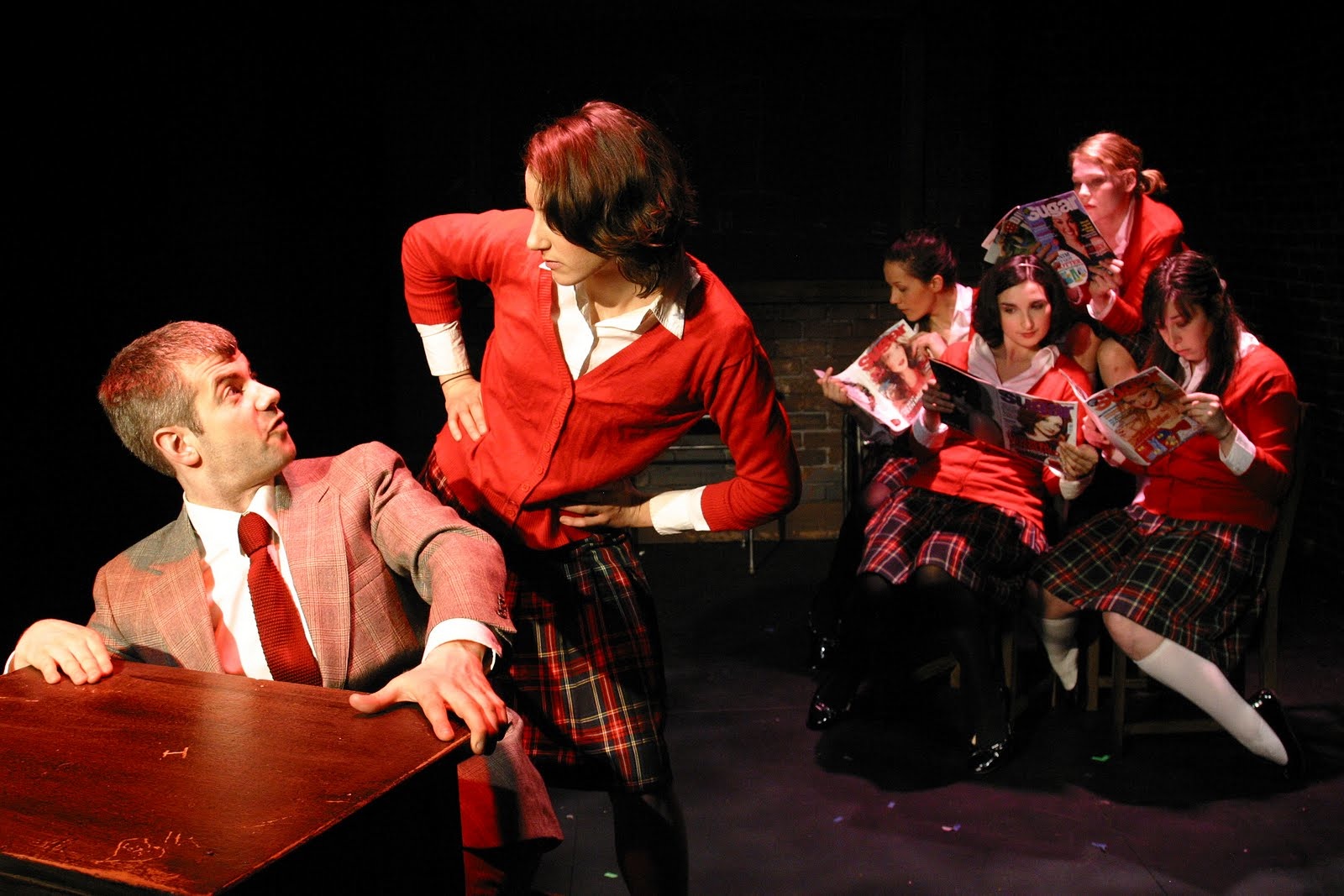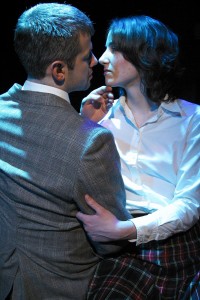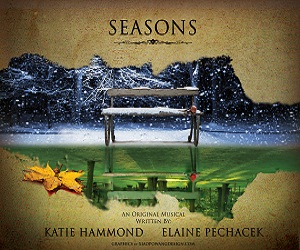
Hangman School For Girls (art by Maya Battle)
Many of us know what we know of British school kids … or British school chums from what we see on the screens both big and little. British children are smart, even the not so bright ones have an air of intelligence that is a bit unsettling. The accent makes them sound very, very wise. Even the little cockney children sound more street smart somehow. Maybe as Americans we forever will look to England as our older sibling who we can’t quite measure up to, who we’re always being compared to. Sure, we’ve got our own style and we can be smart in our own way, but there’s something about the British that will always make us feel like they’re speaking a different language.
You get this feeling when you settle in to watch Hangman School for Girls (written by Lucy Gillespie and directed by Leta Tremblay). From the very first moment there’s no mistaking this play, this school or these girls for British because they’re just so smart.
Hangman School for Girls follows five young girls – Anna (Louiza Collins), Hazel (playwright Lucy Gillespie pulling double duty), Chelsea who almost immediately dominates (Sarah Ann Masse), the terribly impressionable Jenny (Lillian Meredith) and finally Dina (Laura Wiese) – from their very first day to their very last at this exclusive all-girls school. From the moment they all rush in, the estrogen is overwhelming, as it often is when a gaggle of young and excitable girls are meeting for the first time. Ms. Gillespie has a wonderful knack for creating instant bonds that make sense and telling a lot about a girl with very little effort. The bold Chelsea is the leader simply because she declares herself so, and digs her heels into the role by giving praise and doling out reprimands within moments of meeting her fellow classmates. As the alpha female she determines the pecking order, and by doing so she makes Hazel an outcast almost immediately.
This is not to say that Hazel is the weakest of the bunch; frankly all the girls who follow in behind Chelsea are weak in one way or another … in fact weakness makes them natural followers. But intrinsically knowing how to follow the leader makes them better off than Hazel who removes herself; therefore even when they are at their weakest they have their mantle of protection. Hazel, on the other hand, is ostracized almost immediately in part due to the fact that’s she’s so solid about pointedly choosing not to fit in. Just when you think this means a long stretch of lonely years ahead for Hazel, The Desk makes his appearance.

Nick Afka as Desk & Lucy Gillespie as Hazel. Background from back left moving clockwise- Louiza Collins as Anna, Lillian Meredith as Jenny, Laura Wiese as Dina, and Sarah Ann Masse as Chelsea
The Desk (Nick Afka) could be many things, and it’s a bit up to the audience to reason out exactly what that could be. He could be an anthropomorphic actualization of what years and years of girlhood dreams and musing would create were it possible for a desk to come alive, he could simply be a split off of Hazel who, much like a person with dissociative identity disorder creates a second personality as a coping mechanism to deal with the stigma of being a pariah, or he could just be the product of a very rich imagination. Whichever way you slice it, The Desk becomes Hazel’s best friend, sole confidant, romantic paramour, and only haven in this brier of hormones, girlish games, stupid pecking orders and teen pitfalls which Hazel doesn’t quite ever learn to navigate. The Desk becomes part cheerleader – building Hazel up when she’s low, part therapist – analysing her and helping her to visualize her true self, and part creepy uncle – always grabbing at her, ruffling her, and touching her in what he pretends is a playful and innocent way. At least in the beginning…
At first The Desk delights in Hazel. He woos her, he compliments her, and he uses praise to puff her up and illuminate her. Soon enough though The Desk becomes jealous of her, wanting to keep her all to himself. He segregates her whenever he sees even the slightest possibility that Hazel might make friends.
Hazel, however, in her basic nature, can often be cruel. When the timid Jenny voices her fears of the Brownies (small hardworking elf-like creatures who come and finish up work that needs to be done when everyone has gone home) Hazel exploits this fear until Jenny is terrified. Rather than take advantage of a way to make friends, Hazel almost delights in destroying it. Time and again when it would be easy enough to join in a game and become part of the group, she’ll rebel and go off on her own, or retreat to her Desk.

Nick Afka & Lucy Gillespie
As Hazel grows through the years however, The Desk begins to dominate her much the way an abusive husband will dominate his cowering wife. The Desk bullies her, he manhandles her, and all the while there’s a spark in Hazel’s eyes – she is either daring him to do it, or she’s reveling in it. Eventually Hazel does graduate from school and there’s a bit of a hyper realistic ending that leaves you wondering exactly how far Hazel’s powers of imagination actually went.
Playwright Lucy Gillespie, who I interviewed a few weeks ago, has a way with dialogue; her ear is uncanny and she is able to perfectly capture the innocent cattiness that tumbles from young school girls almost without their thinking. She also perfectly captures the growing pains of a tentative girl in a scene between an older Hazel and Chelsea – one of the few where The Desk is not dominating the mind of Hazel. The scene is so awkward and cumbersome that you literally ache for Hazel who is desperately trying to have a connection with Chelsea but just can’t make it happen. Ms. Masse does a wonderful job of portraying the stuck up Chelsea who has her own demons as well; just because we don’t see hers doesn’t mean she isn’t as strongly lead by them as Hazel is by her Desk.
The ensemble of girls do an incredible job of permeating the entire play with the air of girlhood . . . they effortless move from young, childish girls to young women. Kudos to Laura Weise (Dina) who acted as Costume Designer, she was able to give their school uniforms just the right blend of, well, uniformity while still adding those individual touches girls will use in order to stand out from the other girls.
Nick Afka as The Desk does an admirable job; his is not a likeable role but he plays it convincingly with strength and believability; his monologue that closes out the first act is at once heartbreaking and creepy.
Ms. Gillespie writes well beyond her years; this play is worthy of someone much older with a lot more experience under their belt. I can only imagine what her future holds and look forward to see what else she has in store for us.
~~~
HANGMAN SCHOOL FOR GIRLS Written by Lucy Gillespie Directed by Leta Tremblay MARCH 10-27, 2010 MANHATTAN THEATRE SOURCE (177 MacDougal Street) Thursday through Saturday at 8pm Sunday at 3pm Additional performance on March 27 at 2pm. Advance tickets ($15) are available by calling 1-866-811-411 or online at www.theatermania.com. $20 tickets will also be available for purchase at the door.


{ 0 comments… add one now }